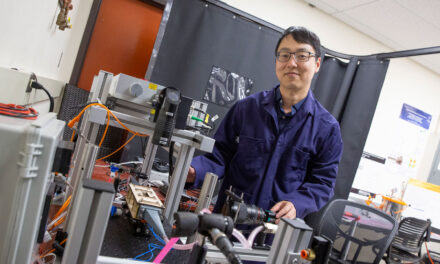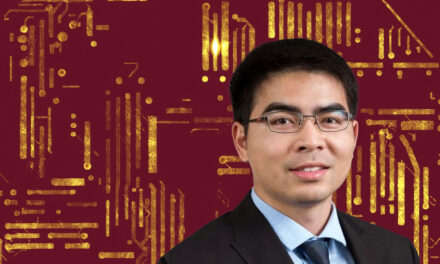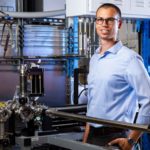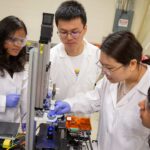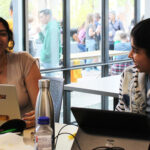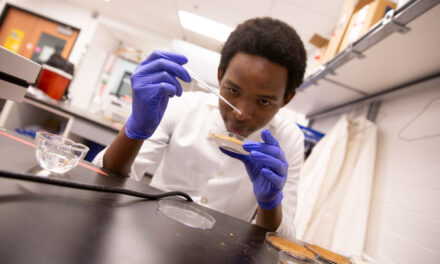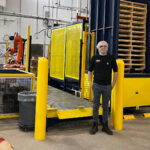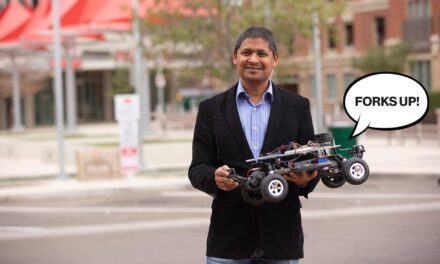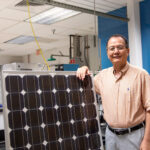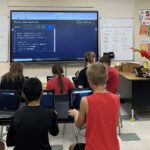
UAV-supported wireless broadband to increase remote access

Above: Assistant Professor Michelusi's aspiration to provide low-cost and energy-efficient broadband access to underserved communities has earned him an NSF CAREER Award. Graphic by Rhonda Hitchcock-Mast/ASU
Nine faculty members in the Ira A. Fulton Schools of Engineering at Arizona State University have received NSF CAREER Awards in 2021.
There is a growing worldwide demand for wireless broadband. A crucial reason is the increasing popularity and unlimited potential of unmanned aerial vehicles, also known as UAVs or drones.
This technology is envisioned as a key component of 5G wireless technology and beyond. UAVs’ low cost, improved line-of-sight over land base stations and controllable mobility will enable affordable wireless broadband access to remote and underserved areas.
The integration of UAVs into wireless networks poses unique challenges since it requires a joint design of the UAVs’ trajectories and wireless communications protocols, which need to operate under uncertain and highly dynamic air-to-ground channel propagation conditions.
Successfully integrating UAVs and wireless networks could lead to stable wireless access for remote communities that lack reliable access.

Nicolò Michelusi joined the School of Electrical, Computer and Energy Engineering in January 2021.
Nicolò Michelusi, an assistant professor of electrical engineering in the Ira A. Fulton Schools of Engineering at Arizona State University, is working on the integration of UAVs into wireless networks by designing cost-effective and scalable solutions with performance guarantees.
Michelusi’s project, “Adaptive Communications and Trajectory Design for UAV-assisted Wireless Networks: a Multi-Scale Decision Framework,” is being funded by a 2021 National Science Foundation Faculty Early Career Development Program (CAREER) Award.
CAREER awards are granted to early career researchers who are potential leaders in their field. The $500,000 grant will provide support for Michelusi’s research project for the next five years.
“My research addresses the global industrial and societal need for ubiquitous wireless broadband access by enabling a cost-effective integration of UAVs into wireless networks,” Michelusi says.
More broadly, his research focuses on the design and analysis of distributed wirelessly connected systems using methods from stochastic (randomly determined) optimization and machine learning.
In addition to his research, Michelusi is integrating an educational and outreach program into his project. This component is designed to foster interests in research and participation of students who are underrepresented in electrical engineering. Outreach activities will be developed in collaboration with programs at ASU and local high schools.
The project will culminate with a proof-of-concept for a networked system of UAVs based on a software-defined radio implementation, in which hardware components are replaced by software programs, and tested on the NSF Platforms for Advanced Wireless Research (PAWR) Aerial Experimentation and Research Platform for Advanced Wireless (AERPAW) testbed.
Michelusi recently joined the School of Electrical, Computer and Energy Engineering, one of the six Fulton Schools. He was recently at Purdue University where he began this line of research. He says he came to ASU because of its reputation as the leading national institution in innovation.
Through the funding provided by the CAREER award, Michelusi will establish his lab and work to position his research group as a leader in next-generation wireless network design.
“We are delighted to add such an exceptional and innovative thinker to our faculty,” says Stephen Phillips, director of the School of Electrical, Computer and Energy Engineering. “His work in integrating UAVs into 5G wireless networks will not only advance science but will enable the deployment of broadband communications to communities around the world that are currently underserved.”


